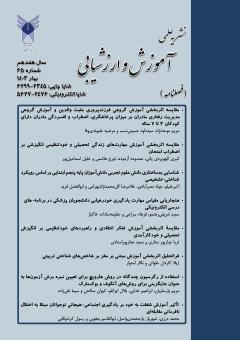هنجاریابی مقیاس مهارت یادگیری خودرهیابی دانشجویان پزشکی در برنامه های درسی الکترونیکی
محورهای موضوعی : روانشناسی تربیتی
سعید شریفی رهنمو
1
![]() ,
فرهاد سراجی
2
*
,
عظیمه السادات خاکباز
3
,
فرهاد سراجی
2
*
,
عظیمه السادات خاکباز
3
1 - دانشجوی دکتری مطالعات برنامه درسی، دانشگاه بوعلیسینا، همدان، ایران
2 - استاد مطالعات برنامه درسی، دانشگاه بوعلیسینا، همدان، ایران
3 - استادیار مطالعات برنامه درسی، دانشگاه بوعلیسینا، همدان، ایران
کلید واژه: هنجاریابی, دانشجویان پزشکی, برنامه درسی الکترونیکی, مقیاس خودرهیابی,
چکیده مقاله :
پژوهش حاضر با هدف هنجاریابی مقیاس مهارت یادگیری خودرهیابی دانشجویان پزشکی در برنامههای درسی الکترونیکی انجام شد. این پژوهش از نظر هدف کاربردی و از نظر ماهیت و روش، توصیفی از نوع همبستگی میباشد. جامعه آماری این پژوهش کلیه دانشجویان پزشکی دانشگاه علوم پزشکی همدان بودند که با تعریف ابزار موردنظر در سایت پرس لاین به صورت اینترنتی در پژوهش حاضر شرکت کردند. با توجه به استفاده از تحلیل عاملی تأییدی در این پژوهش، نمونهای به حجم550 نفر به روش نمونهگیری داوطلبانه و آنلاین پرسشنامه موردنظر را تکمیل نمودند. جهت جمعآوری دادههای موردنظر نیز از پرسشنامه هشت مولفهایخودرهیابی دانشجویان پزشکی در برنامههای درسی الکترونیکی استفاده شد. به منظور تحلیل دادهها نیز ابتدا جهت بررسی عاملهای مقیاس و توزیع گویهها از تحلیل عاملی اکتشافی با استفاده از نرمافزار SPSS-28 و سپس جهت اعتباریابی گویهها و عاملها از تحلیل عاملی تاییدی با نرمافزار Smart-PLS-3 استفاده شده است. نتایج نشان داد بارهای عاملی هر یک از گویهها در 8 عامل پس از چرخش با واریانس مطلوب مورد تایید قرار گرفته زیرا مقدار قدرمطلق این ضرایب بیشتر است و عامل مربوطه نقش بیشتری در کل تغییرات (واریانس) متغیر مورد نظر دارد. بنابراین با توجه به نتایج تحلیل عاملی اکتشافی مولفههای پژوهش در هشت عامل خودکارآمدی، خودمدیریتی، کمکخواهی تحصیلی، انگیزش برای یادگیری، مسئولیتپذیری، خودسازماندهی، خودکنترلی و خودارزیابی با 73 گویه مورد تایید قرار گرفته و از بارهای عاملی مطلوبی برخوردارند. تحلیل عامل تاییدی نیز نشان داد گویههای هر هشت مولفه پژوهش به جز گویه پنج کفایت لازم را برای ماندن در پژوهش دارند و مقادیر بارهای عاملی آنها مناسب بود و از برازش مطلوب برخوردار است. همچنین آلفای کرونباخ برای هر هشت مولفه بیشتر از 7/0 به دست آمده که نشان دهنده پایایی مطلوب است.
The present study was conducted with the aim of standardizing the self-directed learning skill scale of medical students in electronic curricula. This research is a correlational descriptive in terms of applied purpose and in terms of nature and method. The statistical population of this research was all medical students of Hamedan University of Medical Sciences who participated in the present research online by defining the desired tool on the Pressline website. According to the use of confirmatory factor analysis in this research, a sample of 550 people completed the questionnaire through voluntary and online sampling. In order to collect the desired data, an eight-item questionnaire "self-discovery of medical students in electronic curricula" was used. In order to analyze the data, first to check the scale factors and the distribution of the items from exploratory factor analysis using SPSS-28 software and then to validate the items and factors from confirmatory factor analysis with the software Smart-PLS-3 software is used. The results showed that the factor loadings of each of the items in 8 factors after rotation were confirmed with the desired variance because the absolute value of these coefficients is higher and the corresponding factor has a greater role in the total changes (variance) of the item variable. has an opinion Therefore, according to the results of the exploratory factor analysis, the research components were confirmed in eight factors: self-efficacy, self-management, academic help-seeking, motivation to learn, responsibility, self-organization, self-control, and self-evaluation with 73 items and the factor loads They are desirable. The confirmatory factor analysis also showed that the items of all eight components of the research, except for item five, have the necessary sufficiency to stay in the research, and the values of their factor loadings were appropriate and have a good fit. Also, Cronbach's alpha for all eight.

